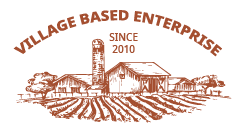
About Noom
About Noom, about Quang Nom, there is a village-based enterprise that was born and grew up in the village. Noom cultivates using sustainable agricultural methods and respects the natural ecosystem. We produce food that carries the rich traditional culinary culture of Quang Nom village. With a business philosophy of shared profits with a community group, we aim to restore the natural environment, preserve and develop indigenous culture. Noom builds a sustainable supply chain, relies on and shares with each other, and depends on the forest for sustainability.
SUPPLY CHAIN
The Relationship Between FOREST and FOODIE
Customers always want to use fresh, delicious, convenient, and readily available food. However, the seasons and the nature of natural foods are never like that. Food comes in a wide variety of qualities, even on the same plant, the quality of the fruits varies greatly.
Farmers blame consumers for demanding too much. Conversely, consumers blame farmers for losing their morals, doing improper things, creating the problem of dirty food, empty food, and rampant chemicals. There is even a situation where 33% of the food produced each year is wasted, causing resource waste, obesity, and being the third leading cause of environmental pollution today.
No one is at fault. Farmers and consumers have lost their connection, not understanding each other in the buying and selling process.
Noom’s mission is to establish a supply chain so that end-users know the exact origin of the type of food and products they are using for their families. Where it is grown, what farming methods are used, who the farmers are, who the workers are, and the processing methods. All information is transparently displayed for each product.
With this supply chain, Noom’s farm is as close to the customer’s backyard as possible, the Noom workshop is like being in the kitchen, and the customer’s house is right next to the edge of the forest.
We chose “noom” as the representative name for the supply chain. Noom is derived from the word “nôm” in Quang Nom dialect. When pronouncing the word “noom,” you can easily recognize the sound “ôm,” which is the root sound of the universe. Many creatures on Earth emit the sound “ôm” when communicating with each other, like a baby learning to speak or even the initial sound in human thought is often “ôm.” Therefore, Noom is like an essential part of the homeland, following the natural and respecting the laws of nature. Noom is also the reverse spelling of “moon,” meaning the moon, symbolizing women. In Noom or in the land of civilization, we respect women because the gentle and meticulous nature of post-harvest work requires gentleness.
CORE VALUES

CROP GROWING AND PRODUCTION STANDARDS

Sun Standard
No greenhouse, no shade net,
use the sun as fertilizer, “machines” for production primarily involve drying and preserving.
No use of high-tech methods in food processing such as irradiation, oxygen bubbling, nitrogen flushing for preservation.
Food always contains vital energy to nourish the body, mind, and soul, not just empty calories.

Natural Organic
No use of chemical fertilizers,
no use of organic fertilizers, only
self-composting organic materials. Pest and disease management is achieved by nurturing diverse organisms for a balanced ecosystem.

Local Food
Native plant varieties,
local personnel, geography, specialties, and local materials.

Whole Food
No refining, no processing,
no extraction, no additives, including both industrial and organic additives. Self-sufficiency in raw materials is maximized.

Zero Waste
Crop cultivation and production
do not create waste, emissions, wastewater. Wastewater is directed straight to the garden. Minimize carbon footprint, nurture the ecosystem.
See details in the Quality Standards for Sustainable Agriculture and Production at Noom Food
RAW MATERIAL SOURCES
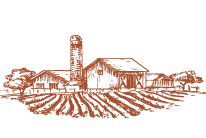
Rice Straw Farm
3.5 hectares – Forest garden cultivation, Dien Ban district, Quang Nam.
(Owned)
Hoi An Ecological Rice Fields
5000m2 – Organic ecological cultivation, Vong Nhi, Cam Thanh, Hoi An.
Xuan Nam Farm
10 hectares – Cultivation of native organic peanuts, sesame, and produce, Dai Thang, Dai Loc, Quang Nam.
(Owned)
Ch’om Farm
01 hectare – Forest garden cultivation, Tay Giang district, Quang Nam.
(Collaboration)
Dong Da Farm
01 hectare – Diverse ecology, closely monitored from the Hoi An KT Room, under the guidance of PGS.
(Collaboration)
Smile Farm
1 hectare – Organic ecological cultivation, Kon Klor2, Dak Ro Wa, Kon Tum.
(Collaboration)
Quang Bo Di Linh
3 hectares – ecological cultivation Di Linh Lam Dong (collaboration)
PRODUCTION FACILITIES

Mechanical cold-pressed oil production facility, unrefined, and warehouse at the headquarters, covering an area of 3,000m2, operating since 2016.
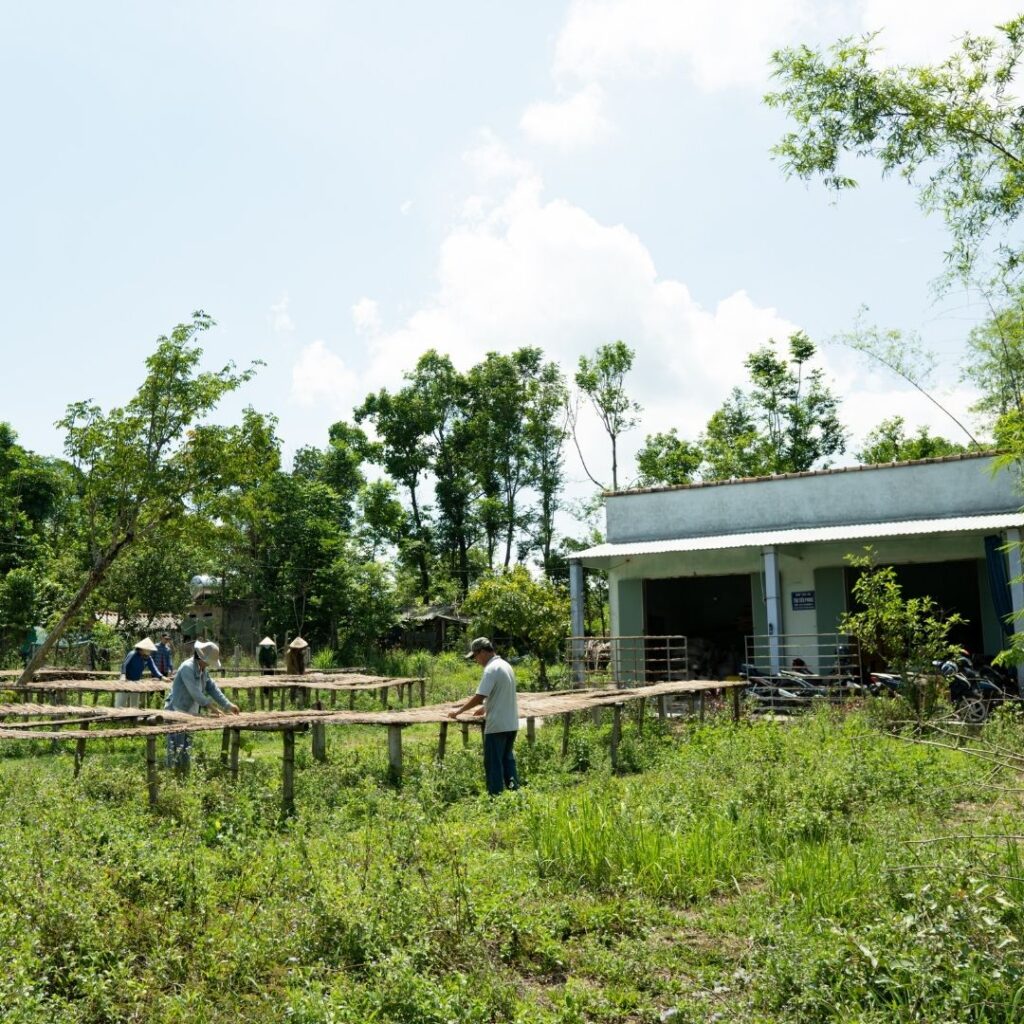
Air-purifying incense production facility in Tien Phuoc, with an area of 1,000m2, operating since 2010.
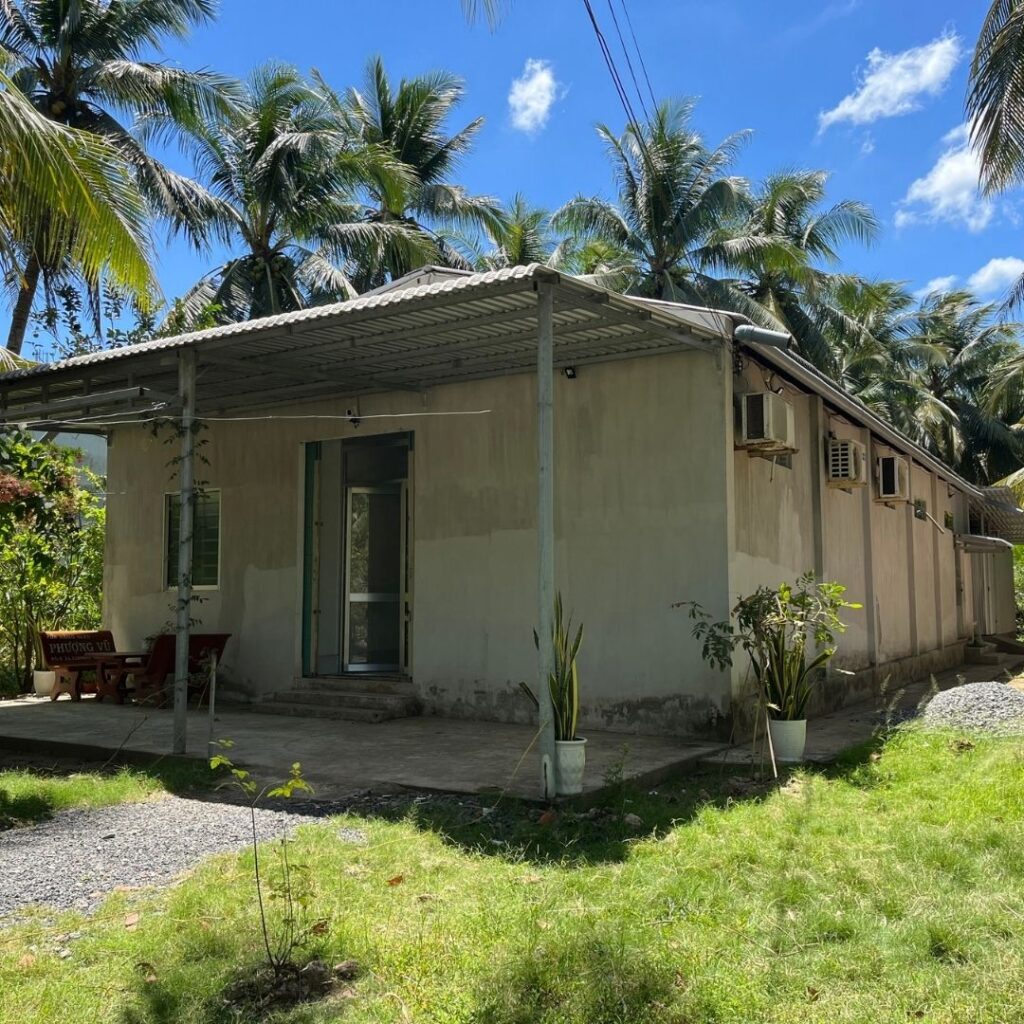
Soap production facility in Ben Tre province, with an area of 500m2, operating since 2019.
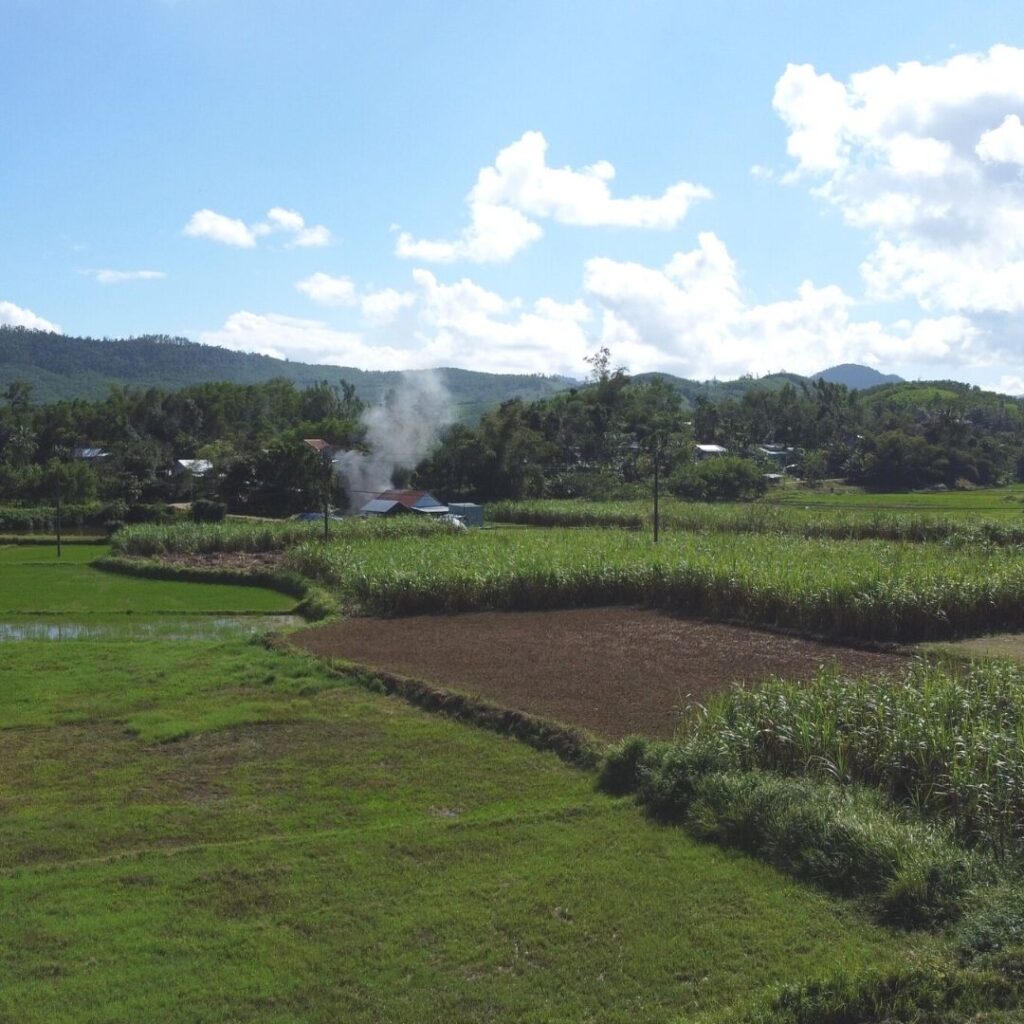
Crude sugarcane processing kiln in Nong Son district, with an area of 500m2, operating since 2015.
Production facilities for dried noodle, quick-frozen fish, and frozen agricultural products at the headquarters.
PRODUCT FOUNDATION
Soil, Air, and Water Conservation
Current agricultural production generates one-third of global greenhouse gas emissions, making it the third-largest contributor to Earth’s pollution. However, the current mass agricultural practices lead to the annual waste of 1.3 billion tons of food, an amount that could feed three continents (Africa, Asia, and the Americas). Despite the discarded food, 829 million people are still suffering from hunger. We are acutely aware of the paradox, inconsistency, and consequences of monoculture agriculture, the use of chemical fertilizers and pesticides, causing severe damage to natural resources. The soil is becoming depleted, water sources are contaminated, and chemicals are deeply infiltrating the land. Clean water sources are scarce, and the natural ecological balance on Earth is disrupted, affecting everything from bacteria, insects, viruses, to livestock, crops, and particularly leading to various diseases in humans, likely caused by ecological imbalances.
Starting from 2010, through persistent experimentation with sustainable agroforestry practices, we have addressed the issues of food surplus, ecological imbalances, reduced carbon footprint, environmental pollution reduction, natural water filtration, and have aimed to restore a green, clean, and balanced natural environment.
Land and Air Protection
Our workshops adhere to the principle of 3 “NOs”: NO waste, NO wastewater, NO air emissions. Waste is composted into fertilizer, wastewater is used for irrigation, and we significantly reduce electricity consumption. We utilize solar energy for drying, employ cold air to freeze raw materials, and adopt sustainable packaging practices such as paper packaging, reusable wooden crates, and minimalistic printing to minimize plastic usage. Single-use plastic and nylon packaging are avoided whenever possible.
Forest Conservation and Reforestation
We promote the message of “preserving a tree” through sustainable farming and forestry practices. Noom supports local farmers and ethnic minorities through self-sustaining financial resources, agricultural techniques, high-price purchasing, assistance with food, seeds, and livestock during unexpected weather conditions, ensuring food security. Additionally, we guide and accompany local communities in sustainable clearing practices that enable self-sufficiency in food and other necessities, reducing reliance on external sources. We implement agroforestry practices right in the local households:
– In the village of Aur, Tay Giang district, a beautiful, pristine village nestled deep within the Son La protected forest.
– In the village of Chà Noóc, Ch’ơm hamlet, Tay Giang district, the most remote and highest village, bordering Laos.
– In the village of Pring, Chà Vàl, Nam Giang district, near the Vietnamese-Lao border crossing.
Cultural Preservation
Local human resources are consistently trained for self-development and the development of their own communities. We respect the diverse local ecology and nurture native species of plants and animals. We preserve and develop traditional products, from the culture of rice cultivation to unique local delicacies that reflect the blend of many ethnic groups (Kinh, Kotu, Giẻ Triêng…) and religions, such as Hinduism (Champa Mỹ Sơn), Buddhism (Hội An), and Christianity. Noom creates high-quality specialty products that embrace the rich fusion of culture and meet international standards of quality.
2023 COMMUNICATION DIRECTION
KEY PERSONNEL
ACCOUNTING
- Phan Thị Thùy Dung – CFO
- Huỳnh Thu Trang
- Võ Minh Trang
- Lương Thị Phương Thảo
WORKSHOPS
-
Oil workshop: Trịnh Thị Kim Anh, Bùi Quân, Nguyễn Phương Ngân
-
Incense workshop: Thái Viết Cường
-
Soap workshop: Nguyễn Thanh Phương
-
Sugar workshop: Hoàng Thị Tưởng
MARKETING
- Lê Phước Lân
FARMS
- Phạm Đắc Đạt
- Phan Xuân Lành
- Alang Nhên
TECHNOLOGY
Lê Mai Viện
PURCHASE
Bùi Thị Hồng Oanh
SALES
- Bùi Thị Hồng Thu – CEO
- Diễm Đặng (Customer Support)
- Nguyễn Thị Thu Trang (Customer Support)

